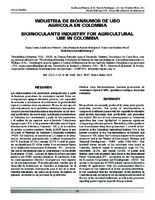Industria de bioinsumos de uso agrícola en Colombia

Date
2015Author
Zambrano-Moreno, Diana Corina
Ramón-Rodríguez, Luisa Fernanda
Van Strahlen-Pérez, Mario
Bonilla-Buitrago, Ruth Rebeca
Metadata
Show full item recordAbstract
Bio-products are primarily produced by using plant growthpromoting
bacteria. This group of microorganisms is
composed of different genera with the capability to stimulate
plant growth increasing their productivity and promoting
bio-control. The use of such microorganisms in Colombian
agriculture has been highlighted to generate significant
changes in production systems. The industry of bio-products
was characterized using three parameters: i. records of bioproducts
at the Colombian Agricultural Institute -ICA, ii. the
patents recorded at the Superintendence of Industry and
Commerce -SIC and iii. the Accession request to the genetic
resources tool at the Ministry of Environment, Housing and
Territorial Development - MADS, within 2004-2011. One
hundred eleven records of bio inoculants were found in
Colombia, destined mainly to ornamental crops (24.7%),
vegetables (16.3%), and cereals (13.2%). At patent level
thirteen ones were identified, nine found in the International
Patent Classification IPC - recognized by the Organization
for Economic Cooperation and Development - OECD. The
access to the database of MADS genetic resource allowed to
identify 16 applications. Only one microorganism Bacillus
thuringiensis was registered at all the assessed institutions.
It was concluded that the development of bio-products in
Colombia is only emerging in the encouragement research of
the use of the microbial biodiversity, as well as the processes
regarding patent register of production processes. Los bioinoculantes son producidos principalmente a partir
de bacterias promotoras de crecimiento vegetal. Estos microorganismos agrupan diferentes géneros, con capacidad
de estimular e incrementar el crecimiento, la productividad
vegetal y controlar otros organismos. El uso de este tipo de
microorganismos, en la agricultura colombiana, tiene potencial para generar transformaciones importantes en los sistemas productivos. En este trabajo, la industria de bioinsumos
en Colombia fue caracterizada a partir de tres parámetros
i. el análisis de los registros ante el Instituto Colombiano
Agropecuario – ICA, ii. las patentes solicitadas ante la Superintendencia de Industria y Comercio - SIC y, iii. la solicitud
de acceso a recurso genético, desde el 2004 hasta el año
2011ante el Ministerio de Ambiente y desarrollo sostenible
-MADS. En Colombia, se encontraron 111 registros de bioinsumos, destinados, principalmente, a cultivos ornamentales
24,7%, hortalizas 16,3% y cereales 13,2%. A nivel de patentes, se identificaron 13, de las cuales, 9 se encuentran dentro
de la Clasificación Internacional de Patentes - IPC - reconocidas por la Organización para la Cooperación y el Desarrollo
Económicos -OCDE- . La base de datos de acceso a recurso
genético del MADS permitió identificar 16 solicitudes. Sólo
un microorganismo (Bacillus thuringiensis) tuvo registro
en las tres instituciones. El estudio permitió concluir que el
desarrollo de bioinsumos en Colombia es incipiente, en el
ejercicio de estimular investigación para el uso de la biodiversidad microbiana, así como los procesos de registro de
patentes, alrededor de los procesos de producción.
Description
Artículo científico
Source
Revista U.D.C.A Actualidad & Divulgación CientíficaShare
Metrics
Collections
- Artículos [40]

